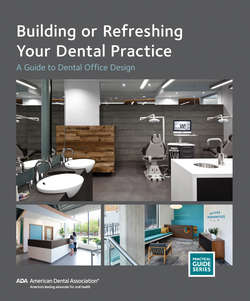Читать книгу Building or Refreshing Your Dental Practice - American Dental Association - Страница 20
На сайте Литреса книга снята с продажи.
Technology Specialist
ОглавлениеThe technology specialist has the biggest learning curve of any of the vendors you will need to hire for your project. “Plug-and-play” results can be realistically expected only if all the pieces of this complex puzzle have been judiciously planned, designed, and implemented (installed). The value of dental experience in this arena cannot be overestimated.
Planning for technology installation in your new office takes a great deal of research and due diligence. The first step should be to understand the practice management software and capture (imaging) software, the foundation of any digital office. The design stage consists of determining where the technology equipment and devices will be located in your office, and what they require to properly function. A critical element of the design phase also involves validating all the individual components as to how they need to be integrated, programmed, and set up. This validation process is a key step towards ensuring a problem-free installation, and demonstrates the value of experience. Trial and error can be very expensive and frustrating. The specialist’s previous experience with a variety of digital and radiology equipment will also be a huge advantage to both you and your staff during training, an important element of the installation phase.
Should the specialist purchase your computer hardware from a large reputable company or custom build your CPUs (central processing units)? CPUs from large, reputable manufacturers come in a variety of sizes, ranging from large to very small, to fit every possible situation. A custom-built CPU starts with a “white box,” which generally comes in two sizes, large or medium. A white box won’t have a manufacturer’s name on the outside, because it is typically made up of components (such as the processor, hard drive, and video card) from a variety of manufacturers. A technology specialist may build their own CPUs to gain a pricing edge over the competition. He or she can piece together various components that may be on sale or discounted to produce a less expensive CPU. If these components are compatible — and that’s a big if — another concern involves warranty issues. If a technology specialist who builds their own computers goes out of business, you have no warranty coverage for these CPUs, while CPUs purchased from a reputable manufacturer still have applicable warranty coverage.
If you purchase custom-built CPUs, your technology specialist must get involved with the custom cabinet design throughout your new office to ensure that these CPUs fit inside the cabinets where indicated, with adequate room for air ventilation.
Be sure your technology specialist offers adequate backup support. Is someone available to either immediately fix your problem from a remote location or send service people to your office on short notice?
If your practice is a HIPAA covered entity, you will require a business associate agreement with your technology specialist if he or she will have access to patient information. Work with a qualified attorney to develop appropriate business associate agreements with any outside individual or entity who will have access to protected health information (PHI) as defined by HIPAA, which can include dental records, images and radiographs, billing records, and insurance information such as explanations of benefits (EOB). HIPAA requires covered entities to safeguard PHI in electronic, hard copy, and spoken form.
Planning for technology installation in your new office takes a great deal of research and due diligence. The first step should be to understand the practice management software and capture (imaging) software, the foundation of any digital office.
